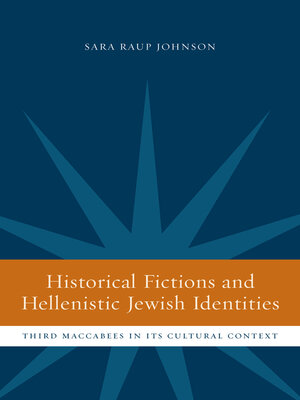Historical Fictions and Hellenistic Jewish Identity
ebook ∣ Third Maccabees in Its Cultural Context · Hellenistic Culture and Society
By Sara Raup Johnson

Sign up to save your library
With an OverDrive account, you can save your favorite libraries for at-a-glance information about availability. Find out more about OverDrive accounts.
Find this title in Libby, the library reading app by OverDrive.



Search for a digital library with this title
Title found at these libraries:
| Library Name | Distance |
|---|---|
| Loading... |
In this thoughtful and penetrating study, Sara Raup Johnson investigates the creation of historical fictions in a wide range of Hellenistic Jewish texts. Surveying so-called Jewish novels, including the Letter of Aristeas, 2 Maccabees, Esther, Daniel, Judith, Tobit, Josephus's account of Alexander's visit to Jerusalem and of the Tobiads, Artapanus, and Joseph and Aseneth, she demonstrates that the use of historical fiction in these texts does not constitute a uniform genre. Instead it cuts across all boundaries of language, provenance, genre, and even purpose. Johnson argues that each author uses historical fiction to construct a particular model of Hellenistic Jewish identity through the reinvention of the past. The models of identity differ, but all seek to explore relations between Jews and the wider non-Jewish world.
The author goes on to present a focal in-depth analysis of one text, Third Maccabees. Maintaining that this is a late Hellenistic, not a Roman, work Johnson traces important themes in Third Maccabees within a broader literary context. She evaluates the evidence for the authorship, audience, and purpose of the work and analyzes the historicity of the persecution described in the narrative. Illustrating how the author reinvents history in order to construct his own model for life in the diaspora, Johnson weighs the attitudes and stances, from defiance to assimilation, of this crucial period.
The author goes on to present a focal in-depth analysis of one text, Third Maccabees. Maintaining that this is a late Hellenistic, not a Roman, work Johnson traces important themes in Third Maccabees within a broader literary context. She evaluates the evidence for the authorship, audience, and purpose of the work and analyzes the historicity of the persecution described in the narrative. Illustrating how the author reinvents history in order to construct his own model for life in the diaspora, Johnson weighs the attitudes and stances, from defiance to assimilation, of this crucial period.







